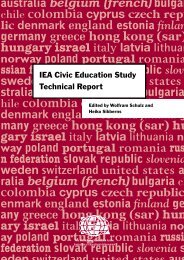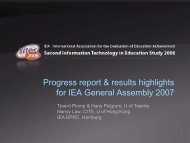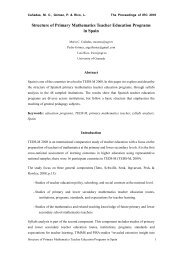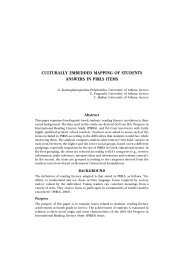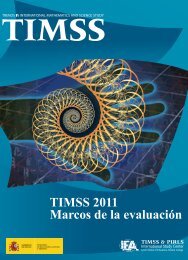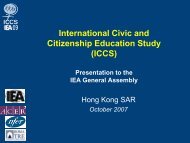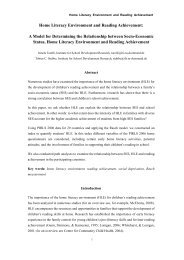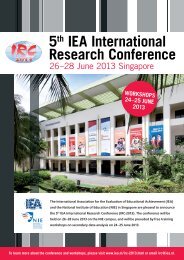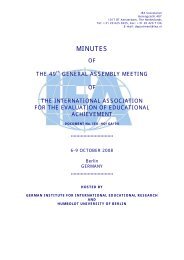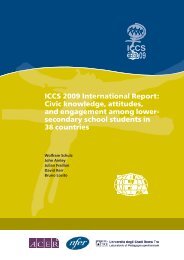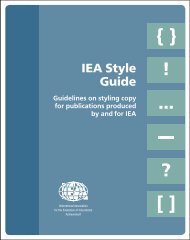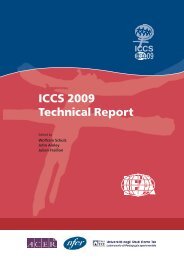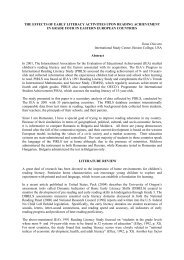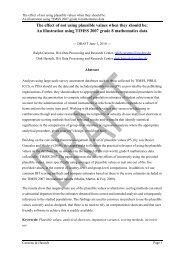Teacher Education and Development Study in Mathematics - IEA
Teacher Education and Development Study in Mathematics - IEA
Teacher Education and Development Study in Mathematics - IEA
You also want an ePaper? Increase the reach of your titles
YUMPU automatically turns print PDFs into web optimized ePapers that Google loves.
This report presents the results of the <strong>in</strong>ternational study on teachers’ relative<br />
salaries. The study, conducted alongside the <strong>IEA</strong> <strong>Teacher</strong> <strong>Education</strong> <strong>and</strong><br />
<strong>Development</strong> <strong>Study</strong> <strong>in</strong> <strong>Mathematics</strong> (TEDS-M), <strong>in</strong>cluded 20 countries represent<strong>in</strong>g<br />
a wide range of economic development levels <strong>and</strong> national educational policy<br />
structures. The countries were Australia, Botswana, Bulgaria, Chile, Ch<strong>in</strong>ese Taipei,<br />
F<strong>in</strong>l<strong>and</strong>, France, Germany, Hong Kong SAR, Italy, Republic of Korea, Mexico, Norway,<br />
the Philipp<strong>in</strong>es, S<strong>in</strong>gapore, Spa<strong>in</strong>, Switzerl<strong>and</strong>, Thail<strong>and</strong>, the United K<strong>in</strong>gdom, <strong>and</strong><br />
the United States.<br />
The data on which the study was based came from various sources: government<br />
documents <strong>and</strong> statistics, official surveys, <strong>in</strong>ternational statistics (Organisation<br />
for Economic Co-operation <strong>and</strong> <strong>Development</strong>, the World Bank), <strong>and</strong> national <strong>and</strong><br />
<strong>in</strong>ternational studies, <strong>in</strong>clud<strong>in</strong>g the <strong>IEA</strong> Trends <strong>in</strong> International <strong>Mathematics</strong> <strong>and</strong><br />
Science <strong>Study</strong> (1995, 1999, 2003) <strong>and</strong> the OECD PISA Programme for International<br />
Student Assessment (2001, 2004).<br />
In this report, the authors compare the salaries of primary <strong>and</strong> secondary school<br />
mathematics teachers with the salaries of <strong>in</strong>dividuals <strong>in</strong> other mathematics-oriented<br />
professions, such as eng<strong>in</strong>eer<strong>in</strong>g, scientific research, <strong>and</strong> account<strong>in</strong>g. They also<br />
<strong>in</strong>vestigate the relationship between what mathematics teachers are paid <strong>and</strong> the<br />
scores of lower-secondary school students on TIMSS <strong>and</strong> PISA. An expected outcome<br />
of the study was that the scores of students on the TIMSS <strong>and</strong> PISA mathematics<br />
tests <strong>in</strong> societies with higher rates of teacher pay would exceed the scores of<br />
students <strong>in</strong> societies with lower rates of teacher pay.<br />
The results partially confirmed this hypothesis: a positive <strong>and</strong> statistically significant<br />
relationship emerged between student performance <strong>and</strong> teacher salaries <strong>in</strong> the<br />
case of male (not female) teachers. This f<strong>in</strong>d<strong>in</strong>g rema<strong>in</strong>ed constant even when the<br />
authors controlled for GDP per capita <strong>and</strong> <strong>in</strong>come distribution. The authors discuss<br />
several possible reasons for this correlation, among them the idea that higher<br />
teacher pay draws <strong>in</strong>dividuals with higher mathematics skills <strong>in</strong>to teach<strong>in</strong>g, thereby<br />
result<strong>in</strong>g <strong>in</strong> better student performance. The lack of a close relationship between<br />
female teachers’ relative salaries <strong>and</strong> student performance is expla<strong>in</strong>ed by the<br />
notion of a separate dynamic <strong>in</strong> most societies related to how well women are paid<br />
relative to men.



